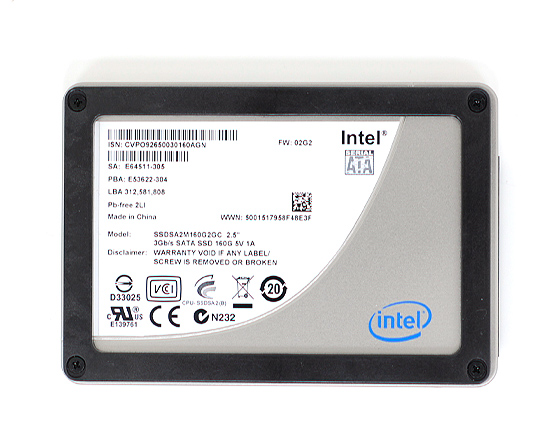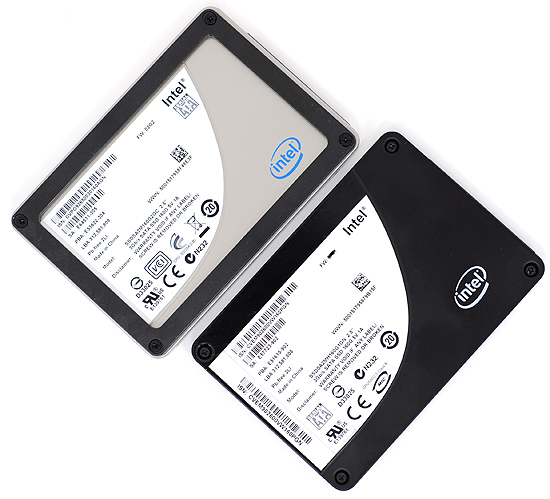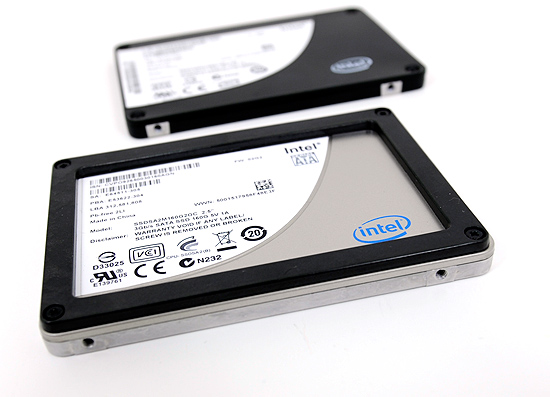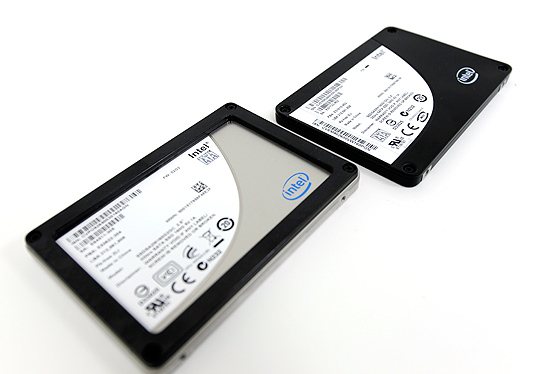Intel X25-M G2: Dissected and Performance Preview
by Anand Lal Shimpi on July 22, 2009 6:00 PM EST- Posted in
- Storage
Be sure to read our latest SSD article: The SSD Relapse for an updated look at the SSD market.
Earlier today the FedEx man dropped off a box with this in it:

That's the new X25-M G2 I wrote about yesterday, which features a slightly improved controller and 34nm NAND flash. Im hard at work on a full review but I thought I'd share some preliminary data with you all.
As I mentioned yesterday, the new drive has a silver enclosure. Intel says the new enclosure is cheaper than the old black one:

The X25-M G2 (top) vs. the X25-M G1 (bottom)


Our sample also shipped with a plastic spacer so the drive can be used in 9.5mm 2.5" bays as well as 7mm bays by removing the spacer.











87 Comments
View All Comments
has407 - Sunday, July 26, 2009 - link
Seen the same on a couple sites. Apparently setting a drive password and then trying to change or disable it can cause the drive to become inaccessible. They're also no longer listed on Newegg.Jefrach - Monday, July 27, 2009 - link
I bought one of these drives from Newegg the day they were released. I just received an email today saying I was getting a refund because they were out of stock and that the item is discontinued. Price was at listed 449.billybob54321 - Saturday, July 25, 2009 - link
Anand-I know application performance is on its way, but I'd love to see individual perforamnce time of actually running applications. The original Intel SSD review focused on copy/launch times whereas I'd be interested in run times of apps after they are launched.
http://www.anandtech.com/storage/showdoc.aspx?i=34...">http://www.anandtech.com/storage/showdoc.aspx?i=34...
For example, I do a lot of work in Photoshop CS4 with big RAW files. It's unclear whether the random read/write speed of the Intel drive would be superior to the sequential write of the Vertex drive when working in PS CS4 because the temp files can get into the 100's of megabytes.
Thanks for your hard work!
erikejw - Friday, July 24, 2009 - link
Is this benchmarked in a used state of the drive?That is how we all use hard drives so if it is not it is pretty worthless for users.
Cov - Friday, July 24, 2009 - link
Here you can find results of someine who tested his SSD (that he just bought)with CrystalDiskMark:http://hardforum.com/showthread.php?t=1436928&...">http://hardforum.com/showthread.php?t=1436928&...
(last posting on that side)
piasabird - Friday, July 24, 2009 - link
These performance tests do not tell you anything.1. How do they compare when actually running programs in an operating system?
2. How do they compare to a standard 500gig Hard Drive?
How are these to be used? Are people planning on using them as hard drive replacements in laptops? What about Heat and cooling requirements like you might mention for RAM or a video card?
The reason I am asking these questions is Microsoft Windows as an operating system is not designed that well to use these devices, and they dont show much advantage when used in cooperation with a hard drive to boot a computer faster. This seems like much todo about nothing when I can purchase a 320GB Drive for about $100.00.
evand - Friday, July 24, 2009 - link
Well, some application benchmarks would be nice. But then, the article is titled "performance preview". If you don't know how to read these numbers and take a guess at what it will mean for you, then don't.They compare very, very favorably to a top of the line, high performance hard disk, and you're asking how well they compare to a drive that said high performance disk will eat for breakfast? Seriously, the comparison almost isn't worth making. If you're really curious, find reviews of the disk you want compared to, and see what high performance rotating drives they compared it against (or go see what regular drives that high performance drive was compared against in its reviews).
People are considering using these on laptops, on desktops as a primary (OS / apps / heavily used data) drive with rotating media for bulk storage, in silent /fanless computers, etc.
Why do you even need to ask about cooling and heat sinks? It doesn't need them. It draws 150mW of power. Putting heat sinks on it would be ludicrous.
So what if Windows isn't "designed" to use these disks? It will use them without any problems. Perhaps a more carefully designed OS could eek a bit more out of them, but so what? It should be worlds faster than any rotating media you can compare it to.
If you want capacity, go buy a 1TB drive to use a secondary data drive for $100, and use one of these for things that care about io performance rather than storage. Splitting your data across the two disks to get both good performance and lots of space isn't exactly hard for the normal desktop usage case.
evand - Friday, July 24, 2009 - link
I was discussing these drives with someone who works in the storage industry with Flash technology, but not these specific drives. He had an interesting observation: a lot of flash drives will keep a pool of pre-erased pages available for writing. However, they can't erase new pages fast enough to keep up with the peak random write performance indefinitely. Once the pre-erased pool runs dry, random write performance drops dramatically.Is this the case with the new (or old, for that matter) Intel drives? How long a time period do your random write benchmarks run for? Would you be willing to run a random writes benchmark that runs long enough to overwrite a larger fraction of the disk, and tell us whether the performance drops under sustained load?
iwodo - Friday, July 24, 2009 - link
I just read other review site that Intel SSD uses SUBSTANTIALLY more CPU usage then other competing SSD. I hope your future detail review will test this out as well.Even thought Intel SSD uses much less power then competing SSD, the CPU usage required will discount those saving. ( Possibly uses even more power. )
In could be another case for Intel to push you buying a more powerful CPU. Which is rather sad. Since this is exactly what happen to USB, which makes it slow and unresponsive compare to Firewire.
pmeinl - Friday, July 24, 2009 - link
Does anybody know PC cases optimized for SSDs.I only found the following enclosures to mount SSDs in cases designed for HDs:
http://vr-zone.com/articles/a-data-ssd-enclosure-t...
http://www.patriotmemory.com/products/detailp.jsp?...">http://www.patriotmemory.com/products/d...prodgrou...
http://www.newegg.com/Product/Product.aspx?Item=N8...">http://www.newegg.com/Product/Product.aspx?Item=N8...